Jesuit Volunteer Reflects: Why can’t they just wait in line?
BY GUEST BLOGGER | June 15, 2015
written by: Elizabeth Vasile, 14-15 Jesuit Volunteer | Tucson, Arizona
Editor’s Note: A version of this post was originally published on Elizabeth’s blog entitled A Year Among the Saguaros
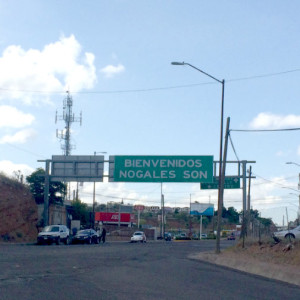
A sign welcoming drivers to Nogales Sonora, Mexico.
“Why can’t they just wait in line?” That is a question I always asked myself when talking about immigration from Central America and Mexico. Being from New York, the issue of immigration is easily swept under the rug. The little knowledge I had on the issue came from the news. My mother is an immigrant from Cuba, so most of my knowledge comes from a very conservative standpoint. It wasn’t until my year with Jesuit Volunteer Corp (JVC) that I realized how ignorant I have been for my whole life.
This past month, I went to Nogales, Arizona and Nogales Sonora, Mexico, with my community and the Albuquerque JV community on a border immersion trip set up by our program coordinator. Through this trip, we experienced the issue of migration first-hand through the Kino Border Initiative (KBI), a Jesuit-run, binational organization focused on the issues of migration.
Our first day at the border, we walked across into Nogales Sonora, Mexico and visited Kino’s “El Comedor,” a place where recently deported migrants can come for a hot meal twice per day and receive medical and financial assistance.
When migrants are detained by U.S. Border Patrol, everything is taken from them. Any money taken by Border Patrol is returned upon deportation, but in the form of a check that cannot be cashed in Mexico, making them useless and leaving migrants with nothing. Often migrants are missing necessary paper documents like IDs.
We served two meals that day at El Comedor. I noticed there was no medical personnel that day, so I offered my EMT knowledge to Thomas, our Jesuit tour guide for the day. With the Spanish translation help of Karina, a native speaker and a JV in the Albuquerque house, I distributed pain medicine to two men and bandaged and wrapped the feet of another. The image of this migrant’s feet is something that will never leave my mind. They were covered in blisters and callouses. He had at least three ingrown nails. It was a very real depiction of what people go through to seek a better life in the United States.
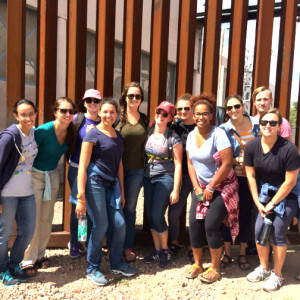
Elizabeth and fellow Jesuit Volunteers at the border fence on the U.S.-Mexico border.
Between meals Thomas brought us to a shelter for recently deported women and children. There, again with Karina translating, we spoke to one of the women. She had lived with her husband and two daughters in Florida for several years, when she got news that her mother in Mexico was sick. She began sending money to help her mother in Mexico. Although leaving her family to return to her ailing mother was risky, she decided to go.
When she arrived in Mexico, she found out that someone else was pocketing the money she had been sending to help her mother and she lost a lot of money. After a few weeks with her mother, she decided to return to the U.S., where she was arrested, detained, and deported. She is now separated from her husband and children in Florida while her family in Mexico will not help her because they believe she abandoned them by moving to the United States.
We cried with her and her story shocked us. Through tears, she shared her gratitude for the bright future her daughters have in the United States and grateful for the people at El Comedor and the women’s shelter for welcoming her and for helping her get back on her feet in Mexico.
The following day, we hiked the migrant trails through the desert and to the border with a group called the Samaritans. We hiked 3.5 miles before dropping food bags and water at the border for traveling migrants. We learned that it is about a two-day walk from where we were in Nogales to this point of the border. Here we could really see how militarized the US-Mexico Border is.
Fr. Pete Neeley, S.J., assistant director of education for KBI, told us the best thing we could do to help the issue of migration is tell people what we saw, tell stories about the people we met, and tell them how this isn’t a political issue but a humanitarian issue.
Since then, I have faced a lot of tension and resistance when relaying my experiences to my family and friends back in the Northeast. The people who are so desperate to come to the United States are in no way living a comfortable life. They are desperate. They are also some of the strongest people I have ever met. With this new, first-hand knowledge and experience, my answer to the question, “Why can’t they just wait in line?” is this: if they could, they would, and since they can’t, as fellow human beings, we need to reach out and help them.
ISN welcomes faith & justice related blog submissions from members of the Ignatian family. Please let us know of any blog ideas or posts using this form: ISN Blog Ideas

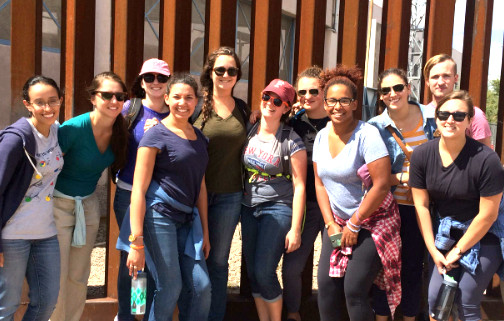
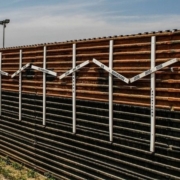
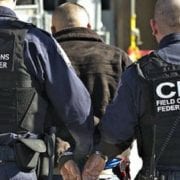
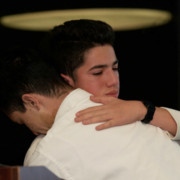
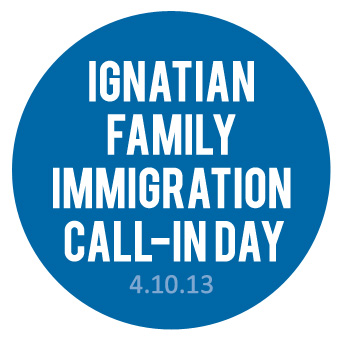





Most of us reading this or hearing a news story re: the “hazards” of immigrating and who ask the ? Why Can’t They Wait?” forget that their very own fore parents in this country were immigrants as well. Who in their time found a much greater reception to their movement into our blessed new land. They were the workers, the needed producers. In some cases however, persons were treated badly, the Irish, the Germans, Hispanics, Italians, those from the Eastern blocs, and the list goes on. It was almost as if one had to run the gauntlet before acceptance as “citizen” material.
Unfortunately, those who seek to come to us today from their hot dry climes seeking shelter and work are a threat to many of us who are safely sequestered in our status as citizens. Citizens who really are not interested in the safety and wellbeing of anyone outside their own small universe;.citizens who never had to wait in line!
We are all children of immigrants unless we are the progeny of indigenous peoples. Let us welcome and enable those who come to seek a better future and are willing to work to create that future!
Greetings of peace! As a former citizen of Tucson, AZ. and a U.S. citizen, having had friends and acquaintences from almost every place on God’s good earth, many of them undocumented Mexicans, I say this: From either perspective, this issue of how to best handle undocumented peoples coming to the U.S. is not some easy, cut and dried matter. Both sides have very valid points to make, and both sides are deserving of respect! Far from being the sole issue at hand, it is nevertheless irresponsible to ignore the fact that terrorists can gain entry to the U.S. via Mexico, both ‘legally’ and ‘illegally,’ and have probably done so already. And not only through our Southern border nor, not only via illegal ways and means, certainly. At this precarious time in our history, we need to be as cautious as possible with regards to whom we are permitting to come into our Country, now more than ever! Every Nation has this right, and it is an obligation as well! While I would love to be able to welcome every stranger, especially homeelss people, on the street into my home for a warm, healthy meal and to extend my hand of friendship, to do so without being reasonably certain no threat to my family or myself would result is my duty as a parent, grandparent, daughter, citizen, and even as a child of God! Should not these same standards apply to peoples all over the world seeking to enter our Country? Thank you for considering my thoughts here. God bless y’all!